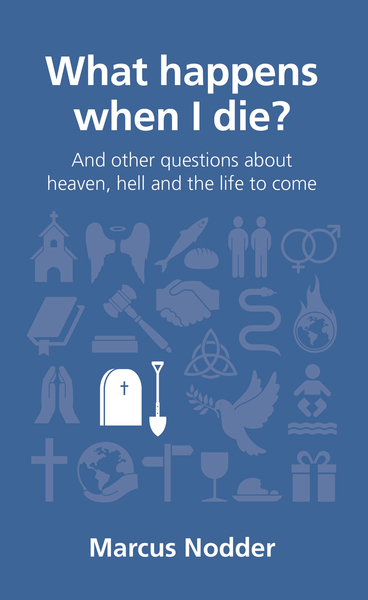
This week we're thrilled to be launching a third book in our new series, Questions Christians Ask: Marcus Nodder's, What happens when I die?.
If we're honest, most of us wonder. The majority of us know what it is to be bereaved and to think about where our loved one has gone. Many of us will have pondered our own future. What will it be like to die? Will we recognise our loved ones? Are there rewards in heaven? Will we see our pets again? Are ghosts for real? These are just some of the questions that flit through our mind - and some of the questions that are tackled in this great new resource from The Good Book Company.
Here's what the book says about the important question of whether we go straight to the Lord's presence when we die or whether we experience soul sleep ...
Soul-sleep or with the Lord?
Soul-sleep is the idea that when a believer dies their soul sleeps until the final resurrection. So you as a person have no conscious existence or awareness in the period between your death and the resurrection of the body at Christ’s return. It is a view which as never had wide acceptance in the church, and against which John Calvin wrote his first book in 1534.
The Bible nowhere refers to the soul sleeping, but it does refer to people dying as “falling asleep” (1 Corinthians 15 v 6; 1 Thessalonians 4 v 13,14). This is simply a picture of the wonderful reality that, for the Christian, death is only temporary, just as sleep is temporary, and raising his people from death will be as easy for God as it is for us to wake up someone who is asleep. Jesus demonstrates this with Lazarus (John 11 v 11) and the ruler’s daughter who died (Matthew 9 v 24-25), both of whom Jesus said were only sleeping, before he raised them to life.
When a Christian dies, it is their body that “sleeps”, awaiting the final resurrection. In fact the word cemetery comes from a Greek word meaning “a sleeping-place”. A cemetery is a dormitory for the body, but in soul or spirit the believer goes immediately to be with the Lord. For Paul, to die meant being at home with the Lord (2 Corinthians 5 v 8). Jesus assured the dying thief that “today you will be with me in paradise” (Luke 23 v 43), and his story of the rich man and Lazarus was of two men who were very much conscious after death (Luke 16 v 19-31). Moses and Elijah, though long dead, appeared at the Transfiguration talking with Jesus (Mark 9 v 4). John sees the souls of the martyrs not asleep but asking the Lord “How long?” (Revelation 6 v 9-10).
When we worship, we are joining with the spirits of believers now worshipping in heaven (Hebrews 12 v 22-24). This is why to die is “better by far” because it is to “depart and be with Christ” straight away (Philippians 1 v 23), even if the best is yet to come at the final resurrection.
Cat